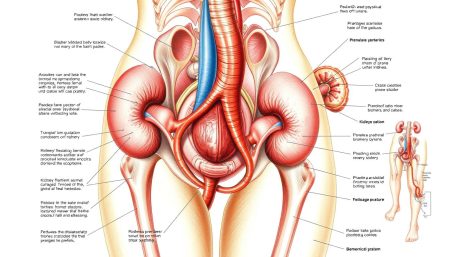Prostate cancer is a big worry for many men, but there’s hope. This guide looks at how treatable prostate cancer is. We’ll cover treatment choices and survival rates. Plus, we’ll talk about new medical breakthroughs in prostate cancer care.
Knowing about prostate cancer treatment is key for patients and their families. There are many options, like surgery and radiation therapy. We’ll explain these choices and how they affect survival rates. This guide is for those newly diagnosed or supporting someone who is. It aims to offer clear, useful info for the journey ahead.
Understanding Prostate Cancer: Stages and Diagnosis
Diagnosing prostate cancer is a detailed process. It starts with screening and ends with knowing how far the cancer has spread. Finding cancer early is key to better treatment results, similar to breast cancer screening.
Early Detection Through PSA Testing and Screening
Screening for prostate cancer often begins with a PSA blood test. This test checks PSA levels in the blood, which can show prostate problems. Regular tests can find cancer early, boosting treatment success.
Different Stages of Prostate Cancer Explained
Prostate cancer stages range from I to IV. Each stage shows how far the cancer has spread. Stage I cancer is still in the prostate, while Stage IV has spread far away. Knowing the stage helps decide the best treatment.
| Stage | Description | 5-Year Survival Rate |
|---|---|---|
| I | Cancer confined to prostate | Nearly 100% |
| II | Cancer still in prostate but more advanced | Nearly 100% |
| III | Cancer spread beyond prostate | Nearly 100% |
| IV | Cancer spread to distant parts | 30% |
Diagnostic Methods and Accuracy Rates
Diagnosing prostate cancer involves several tests. These include digital rectal exams, MRI scans, and prostate biopsies. Each test has its own benefits, with biopsies being the most accurate but also the most invasive. Using all these tests together improves the accuracy of prostate cancer diagnosis.
Is Prostate Cancer Curable: Treatment Options and Success Rates
Prostate cancer treatment has made great strides, offering hope to many. The question “is prostate cancer curable” depends on several factors. Early detection and medical advancements have greatly improved outcomes for those with this disease.
Treatment options for prostate cancer vary based on the stage and aggressiveness of the disease. Common approaches include:
- Surgery (radical prostatectomy)
- Radiation therapy
- Hormone therapy
- Active surveillance
Each option has its own success rates and side effects. Surgery and radiation therapy often have high cure rates for early-stage cancer. Hormone therapy can manage advanced cases well.
Success rates for prostate cancer treatment are promising. The five-year survival rate for all stages is nearly 100% with early detection. Even in advanced stages, treatment can extend life and improve quality of life.
“With early detection and appropriate treatment, many men can overcome prostate cancer and lead fulfilling lives.”
It’s important to work closely with healthcare providers to find the best treatment plan. Regular check-ups and screenings are key for early detection and successful outcomes. While challenges exist, research continues to improve treatment options and outcomes.
| Treatment | 5-Year Success Rate | Best For |
|---|---|---|
| Surgery | 91% | Localized cancer |
| Radiation | 88% | Early to mid-stage |
| Hormone Therapy | Varies | Advanced stages |
Remember, each case is unique. Consult with specialists to explore the most suitable prostate cancer treatment for your specific situation.
Modern Treatment Approaches for Prostate Cancer
Prostate cancer treatment has changed a lot lately. Doctors now use many methods to fight this disease. They choose the best approach for each patient.
Radical Prostatectomy: Surgical Solutions
Surgery is still a key treatment for prostate cancer. Radical prostatectomy means taking out the whole prostate gland and nearby tissues. It can save many men’s lives if their cancer is caught early.
Radiation Therapy: External Beam and Brachytherapy
Radiation therapy kills cancer cells with high-energy beams. External beam radiation comes from outside the body. Brachytherapy puts tiny radioactive seeds inside the prostate. Both are good ways to treat prostate cancer.
Hormone Therapy and Its Role in Treatment
Hormone therapy lowers testosterone levels. This can slow or stop prostate cancer from growing. It’s often used with other treatments or for more advanced cases.
Emerging Treatments and Clinical Trials
New treatments for prostate cancer are being developed all the time. Immunotherapy, targeted therapies, and gene therapy are being tested in clinical trials. These new methods might help patients with advanced or hard-to-treat prostate cancer.
| Treatment Type | Typical Use | Advantages |
|---|---|---|
| Radical Prostatectomy | Localized cancer | Complete removal of tumor |
| Radiation Therapy | Early to advanced stages | Non-invasive option |
| Hormone Therapy | Advanced or recurrent cancer | Slows cancer growth |
| Emerging Treatments | Various stages, often in trials | Potential for better outcomes |
Survival Rates and Recovery Expectations
It’s important for patients and their families to know about prostate cancer survival rates and recovery. Early detection is key to a better prostate cancer prognosis. Let’s look at the statistics and what affects recovery.
Five-Year Survival Statistics by Stage
Survival rates for prostate cancer depend on the stage at diagnosis. Here are the five-year survival rates:
| Stage | 5-Year Survival Rate |
|---|---|
| Localized | Nearly 100% |
| Regional | About 100% |
| Distant | 30% |
These numbers show why early detection and treatment are crucial. Local and regional cancers have much higher cure rates than distant ones.
Quality of Life After Treatment
Life after prostate cancer treatment can change. Some men face:
- Urinary incontinence
- Erectile dysfunction
- Bowel issues
Most of these side effects get better with time. Support groups and lifestyle changes can help keep quality of life high.

Long-term Monitoring and Follow-up Care
Regular check-ups are vital for prostate cancer survivors. Follow-up care includes:
- PSA blood tests
- Digital rectal exams
- Imaging tests as needed
This ongoing monitoring catches any recurrence early. It ensures the best long-term outcomes.
Risk Factors and Prevention Strategies
Knowing about prostate cancer risk factors is key to catching it early. Men over 50 are at higher risk. Family history also matters, especially if relatives have had it.
What you eat and how active you are can affect your risk. Eating a lot of red meat and dairy might raise your risk. But, eating more plant-based foods can help. Staying active and keeping a healthy weight are also important.
Spotting prostate cancer symptoms early is crucial. These symptoms include:
- Frequent urination, especially at night
- Difficulty starting or stopping urination
- Weak or interrupted urine flow
- Blood in urine or semen
- Painful ejaculation
Getting screened early with PSA tests and digital rectal exams can help. Talk to your doctor about your risk factors. They can help decide when you should get screened.
| Risk Factor | Impact Level | Prevention Strategy |
|---|---|---|
| Age (over 50) | High | Regular screenings |
| Family History | High | Genetic counseling |
| Diet (high in red meat) | Moderate | Increase plant-based foods |
| Sedentary Lifestyle | Moderate | Regular exercise |
| Obesity | Moderate | Maintain healthy weight |
By tackling risk factors and watching for symptoms, men can prevent and catch prostate cancer early. This is a big step toward staying healthy.
Coping with a Prostate Cancer Diagnosis
Getting a prostate cancer diagnosis can feel overwhelming. It’s normal to feel scared, anxious, or even angry. But remember, you’re not alone. Many men have gone through this and come out stronger with the right support and mindset.

Talking openly is important when you get a prostate cancer diagnosis. Share your feelings and worries with your loved ones. Their support can greatly improve your emotional health and help you through treatment.
Learn about your treatment options for prostate cancer. Knowing your choices can help you make better decisions about your care. Don’t be afraid to ask your healthcare team questions or seek a second opinion. It’s okay to share your thoughts and preferences about treatment.
“Understanding your diagnosis and treatment options can help you feel more in control of your health journey.”
Think about joining a support group for men with prostate cancer. Talking to others who know what you’re going through can offer comfort and useful advice. Many hospitals and cancer organizations have these groups, both in-person and online.
Don’t forget about your mental health during this time. Do things that make you happy and help you relax. Activities like exercise, meditation, or hobbies can help manage stress and improve your well-being as you go through treatment.
- Communicate openly with loved ones
- Learn about your treatment options
- Join a support group
- Prioritize mental health
- Stay physically active
Coping with a prostate cancer diagnosis takes time. Be kind to yourself and take things one day at a time. With the right support and attitude, you can face this challenge head-on and aim for the best outcome.
Future Outlook: Advancements in Prostate Cancer Research
The future of prostate cancer treatment is looking up. Researchers are working hard to find new ways to fight this disease. Targeted therapies are one area they’re focusing on.
These treatments aim to kill cancer cells without harming healthy ones. This could lead to fewer side effects for patients.
Immunotherapy is another exciting area of research. It uses the body’s immune system to fight cancer. Scientists are creating vaccines and other methods to boost the immune response against prostate cancer cells.
These new treatments could greatly improve the prognosis for many patients.
Precision medicine is also changing how doctors treat prostate cancer. It uses genetic information to create personalized treatment plans. By understanding each patient’s unique cancer, doctors can choose the most effective therapies.
This tailored approach could lead to better outcomes and higher cure rates.
As research continues, we can expect more breakthroughs in prostate cancer care. New tests may help catch the disease earlier. Advanced treatments could offer hope to those with hard-to-treat cancers.
While there’s still work to be done, the future of prostate cancer treatment is looking brighter than ever.
FAQ
Q: Is prostate cancer curable?
A: Yes, prostate cancer can be cured if caught early. The chance of cure depends on the cancer’s stage, grade, and the patient’s health. Many men with early-stage cancer do well with surgery or radiation.
But, advanced cancer is harder to cure. Still, it can often be managed as a long-term condition.
Q: What are the most common treatments for prostate cancer?
A: Common treatments include radical prostatectomy (surgical removal), radiation therapy (external beam or brachytherapy), hormone therapy, and active surveillance for low-risk cases. New treatments like immunotherapy and targeted therapies are also being tested.
Q: What are the survival rates for prostate cancer?
A: Survival rates for prostate cancer are good. The 5-year survival rate for all stages is about 98%. For early-stage cancer, it’s nearly 100%.
But, for advanced cancer, the 5-year survival rate drops to about 30%. Better screening and treatments have improved these rates over time.
Q: How is prostate cancer diagnosed?
A: Doctors use PSA blood tests, digital rectal exams (DRE), and prostate biopsies to diagnose prostate cancer. They also use MRI and PET scans to check how far the cancer has spread.
Q: What are the stages of prostate cancer?
A: Prostate cancer is divided into four stages:
Stage 1: Cancer is in a small area of the prostate.
Stage 2: Cancer is in the prostate but may be larger or in both lobes.
Stage 3: Cancer has spread beyond the prostate but hasn’t reached distant parts of the body.
Stage 4: Cancer has spread to distant parts of the body, like bones or lymph nodes.
Q: What are the risk factors for prostate cancer?
A: Risk factors include age (risk increases after 50), race (higher risk in African American men), family history of prostate cancer, and certain genetic mutations. Diet and obesity may also play a role, though their impact is less clear.
Q: How can I cope with a prostate cancer diagnosis?
A: To cope, educate yourself about the disease and treatment options. Talk openly with your healthcare team. Seek support from family, friends, or support groups.
Consider counseling if needed. Maintain a healthy lifestyle. Many men live long, fulfilling lives after a diagnosis.
Q: What are the latest advancements in prostate cancer research?
A: Recent advances include better imaging for early detection, targeted therapies, and immunotherapy. Genetic testing helps personalize treatment plans. Researchers are also exploring new, less invasive treatments and ways to improve quality of life.
Q: How often should men be screened for prostate cancer?
A: Screening recommendations vary. Men should discuss screening with their doctor starting at age 50. African American men or those with a family history may need to start earlier, around age 40-45.
The frequency of screening depends on individual risk factors and PSA levels.
Q: What are the symptoms of prostate cancer?
A: Early-stage prostate cancer often has no symptoms. As it progresses, symptoms may include difficulty urinating, weak or interrupted urine flow, frequent urination (especially at night), blood in urine or semen, erectile dysfunction, and pain in the hips, back, or chest if the cancer has spread.
However, these symptoms can also be caused by non-cancerous conditions. It’s important to consult a doctor for proper evaluation.


















